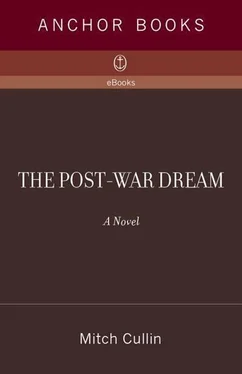How distant the Panhandle of Texas must have felt to McCreedy — the cotton rows surrounding the family farm, the red-stone gashes of the Caprock canyons, the wide-open spaces which comprised the high, dry plains; how remote and dreamlike it all must have seemed when first riding by truck among South Korea's lush, mountainous scenery: the soldiers having caught glimpses of an impoverished countryside — village shacks tilting at the edge of hazy fields which were dotted with half-naked laborers, bone-thin dogs roving in packs on the roadway, sullen Korean faces watching as the military trucks rolled past — while far beyond the mountains, a hundred or so miles away, fellow soldiers were already dying beside the banks of a fast-flowing river, some drowning, too, when crossing the rushing stream to escape an onslaught of North Korean troops. For McCreedy, however, it wasn't yet the grim reality of battle which had immediately repulsed him, nor was it the possibility of a violent end which initially troubled his mind; instead, it was the ceaseless stench rising from the fields which wrinkled his brow, the noxious odor of human excrement combined with ash and used as fertilizer.
“This place is shit,” he ‘d shouted while en route to the bivouac at dusk, waving a hand in front of his face as if he were shooing a fly.
“You got that right,” another soldier responded, answering him from the midst of the identical shapes riding there.
Staring out at the darkening landscape, McCreedy had clamped the hand over his nose, holding it there as the vehicle proceeded — the bodies around him swaying or lifting with the bumps and turns in the road, the pennies sliding inside his pockets as they were all carried into the night. But if Korea was, to him, a foul land where its primitive people appeared unwelcoming — its water often contaminated, its mosquitoes surpassing the enemy troops in staging attacks — he at least found comfort in the little things, like writing letters to send home, counting his pennies, playing poker for match-sticks or cigarettes, and proudly speaking the password which had allowed entry through the bivouac perimeter: “Texas, sir! Texas!”
Hollis, on the other hand, didn't share his outspoken comrade's disdain for where they had been sent. In fact, he was quietly captivated by such a peculiar locale, a territory and culture so different from what had defined his life that he felt somehow transformed within its borders. To his mind, the southern part of Korea was like an imaginary place, a fiction, only to be discovered on the pages of novels, or spotted momentarily in grainy news-reel footage; yet presently the divided country unfolded — vividly, completely, replete with shades of green and blue and gray — and, as well, he was enveloped wholly by its otherness after a South Korean train soon transported the 2nd Battalion from bivouac to the war front (his rucksack destined for a march along winding trails, his darting eyes shadowed beneath a steel helmet and surveying the hillsides, his lungs breathing the heavy summer air when eventually moving deeper and deeper into that exotic, deceptively serene world).
Still, Hollis could agree with McCreedy that Korea was nothing like Japan, a nation which, by comparison, was more developed, more complacent in defeat, and, without question, cleaner. In parts of Tokyo, there was at least something resembling the leisure many of the soldiers had enjoyed back in the States; there were Japanese big bands playing American music at Ginza nightspots, and taxi dancers wearing evening dresses, and cheap beer. The Japanese, it seemed, were also more refined by nature than the dirt-poor Koreans, and because they had never suffered decades of subjugation and violent occupation, they lacked the hard, untrusting collective traits of a long-ago broken, scarred people. That being the case, Hollis fostered a greater feeling of sympathy for the Koreans than he did for the Japanese (the Koreans were, after all, really warring with themselves and not directly against the United States of America), while McCreedy — shaking his head beside Hollis during the twenty-hour train trip, scowling on his wooden seat at the shirtless women toiling in fields beyond the cramped passenger car — did little to conceal the contempt he felt for those he regarded as subhuman by default: “Like a bunch of pigs wallowing about in their own filth.” And, he believed, their impossible language was coarse, distraught in tone, sounding like a wounded heifer echoing its pain. Furthermore, they lacked the fundamental and essential understanding of a Christian God, of the Lord's sacrifice.
“Honestly, Creed wouldn't fuck a single one of them, even if I wanted to — unless Christ himself ordered me to.”
“I wouldn't either,” Hollis had replied, sketching in his notepad and not paying much attention to his comrade's grumbling, pondering instead the warning their captain had recently made clear to each carload of soldiers: the enemy might be hiding among Korean refugees from the north, blending in without uniform, disguised as civilians.
McCreedy glanced down at Hollis's drawing. “There you go,” he said, nodding resolutely at what he saw. A shaggy gorilla was taking shape on the notepad, standing at the center of a bean field, holding a banana in one fist and a hand grenade in the other; the caption above it read: what kind of guerrilla are you? “You see, we're on the same page. We're like two sides of the same coin.”
“Maybe.”
Later on — once the steam engine had climbed the Autumn Wind Pass, chugging for Yongdong County and the front line — McCreedy stood in the aisle of the passenger car, his body rocking with the train's movements, and said, “Hey, you all give me your ears for a sec, will you?” At that moment conversations ceased, every set of eyes fixed on him, and, relishing the sudden attention with a grin, he held out his tin drinking cup, pivoting so all could see it. “Let Creed show you a little something about these folks we're fighting against and these folks we're helping out here. Let me give you a little insight about just how their kind of mentality operates.” He produced three of his pennies, explaining that the Koreans named their newborns by dropping spare change into an empty can, the resulting clanking noises determining a child's lifelong moniker. “Goes like this, right? Listen closely, if you can.” He shook the pennies from his hand, sprinkling them into the cup. “Park-Clink-Kim,” he announced, bringing a few hoots and a smattering of laughter which were subdued beneath the train's continual rumbling. He sprinkled the pennies again: one after another after another. “That'd be a Clink-Kim-Park.” Again. “And that's Park-Park-Clink.”
Almost everyone, it seemed, was delighted by McCreedy's joke — everyone, that is, except Hollis, who, shifting his gaze to the window, ignored McCreedy's gleaming stare and recurring wink (“Now who's got a smoke or two for ol’ Creed?”) and beheld a rice paddy shimmering under the sun, then thatch huts, then a swift blur of oxcarts on a dirt road near the railroad tracks, belonging to what he suspected was a weary group of battle-fleeing refugees. Before long the voices of McCreedy and the other soldiers grew fainter to him, and the sound of the train became all embracing. In the distance, where sunlight reflected off more rice paddies, he saw the silhouette of a girl leaning against a parked bicycle and supporting herself on crutches.
When the 2nd Battalion began disembarking a few miles behind the Yong-dong front — filing onto the station platform, bringing C rations and full canteens, slouching under the weight of rucksacks, sporting eight-round M1 ammunition clips on cartridge belts — the soldiers they had come to replace stood waiting there, greeting the new arrivals without as much as a smile, posed haphazardly like a living tableau which depicted the aftermath of battle. It was as if they were being met by future visions of themselves, an opaque mirror image casting a grim reflection of what lay ahead. Stepping from the train in relatively clean uniforms, bright eyed and green, the young men of the 2nd Battalion were taken aback by their counterparts from the 24th Infantry Division: boys like themselves yet somehow made older than their years and now worse for wear — some bandaged about the head and arms, some on stretchers, most in grubby fatigues — each stubbled face looking beaten; but once the passenger cars were emptied, those tired expressions quickly betrayed varying degrees of relief as the men slowly ambled forward and started boarding the train.
Читать дальше










![Theresa Cheung - The Dream Dictionary from A to Z [Revised edition] - The Ultimate A–Z to Interpret the Secrets of Your Dreams](/books/692092/theresa-cheung-the-dream-dictionary-from-a-to-z-r-thumb.webp)

